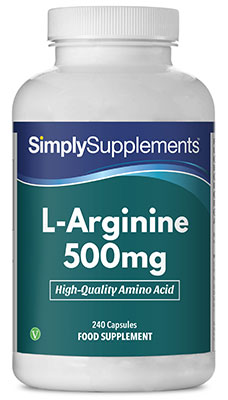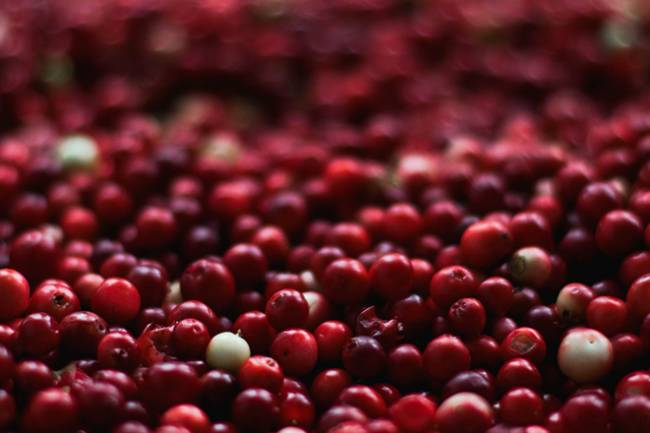Health Benefits of Arginine

Arginine is a semi-essential amino acid important for blood flow and heart function. It has been shown to reduce the risk of heart disease, accelerate wound healing, and enhance sexual function.
What is Arginine?
Amino acids are the building blocks of protein in the body. 75% of the body is made up of chains of amino acids and every chemical reaction that occurs relies on one or more amino acid. Arginine normally constitutes 5% to 7% of the amino acid content of a typical healthy adult.
Arginine was first isolated in 1886 and has since been the subject of extensive research and clinical trials. It is one of 20 amino acids and is considered to be semi-essential as the body can produce certain amounts, but during times of growth, stress or trauma higher dietary intakes are required.
Arginine stimulates the production of hormones including insulin, the growth hormone, and insulin-like growth factor, and is a precursor to nitric oxide. The endothelial cells produce nitric oxide to help the blood vessel walls stay relaxed and open for blood flow, which improves the supply of oxygen and nutrients to organs.
What’s the Difference Between Arginine and L-arginine?
Not much. The use of two names is a common source of confusion but they are actually referring to the same ingredient. There are twenty components of arginine and ‘L’ is the form commonly used in supplements. You may also see ‘D’ which is sometimes used in laboratory research. However, the benefits are the same and the two names are often used interchangeably.
Benefits of L-arginine
- Circulation: Many of arginine’s benefits stem from its ability to generate nitric oxide which causes smooth muscle cells to relax and expand. As blood flow improves, more oxygen and glucose is delivered to the body’s tissues. As a result, arginine improves peripheral circulation and may offer support against common circulatory conditions such as intermittent claudication. Studies have shown that diets high in arginine can reduce narrowing of the blood vessels in the legs caused by fatty deposits and improve walking distance.
- Heart disease: Arginine improves the function of blood vessels and enhances coronary blood flow. Nitric oxide makes the arteries more elastic, which helps to lower blood pressure and reduces the build-up of arterial plaques, blood clots, and platelet clumping. As a result, arginine has been used in the treatment of coronary heart disease, angina, and clogged arteries. However, heart attack patients are warned to avoid mega high doses of arginine, as excess nitric oxide may have adverse effects. One study involving heart attack patients had to be discontinued.
- Erectile dysfunction: Insufficient blood flow is a common cause of erectile dysfunction. Arginine works in a similar way to drugs like Viagra by increasing nitric oxide, which dilates blood vessels and improves circulation. As a result, arginine can improve blood flow to the genital area, helping it to enlarge to its full capacity. Arginine also has benefits for women; increasing blood flow to the genital area can increase libido and sensation.
- Wound healing: Studies have shown that people with diets low in arginine often have impaired wound healing due to reduced collagen deposition in wound sites. Arginine induces the production of hormones that stimulate metabolic pathways essential for wound healing, including the growth hormone (GH). It also improves blood flow to wounds and increases the synthesis of reparative collagen required for healing. As a result, it enhances wound strength, restores the functionality of damaged tissues, and increases the speed and thoroughness of healing.
- Bodybuilding: L-arginine supplements are important for those who are interested in bodybuilding. The presence of arginine is required for the body’s synthesis of most proteins and it signals the release of growth hormones that promotes lean muscle mass. The circulatory benefits of arginine can also enhance endurance and conditioning by improving blood flow to the muscles during a workout. The increased oxygen and nutrients support recovery and reduce muscle damage and soreness.
Arginine Foods
Arginine is present in many protein-rich foods. The best animal-based arginine foods are beef, chicken and pork. Fish such as tuna, salmon and halibut are also particularly high in arginine. Dairy products such as eggs, milk and yoghurt (particularly Greek yoghurt) are also good sources.
Good plant-based arginine foods are soya beans, peanuts, pumpkin seeds, and sesame seeds. Grains such as oats, rice and wheat, and pseudo grains like quinoa are also high in arginine. The superfood spirulina also provides an array of amino acids including arginine.
Arginine is also sold as a dietary supplement, usually with the name L-arginine. It is available in several forms including tablets and injections.
L-arginine Dosage
The average dietary intake of arginine is around 2.5 grams to 5 grams a day and this is normally sufficient to meet the body’s basic requirements for protein synthesis and tissue repair. However, the dosage depends on the condition you are trying to treat. Some people may need higher intakes depending on their age, inflammation level, condition of the heart and circulatory system, digestive issues, diet, and genetics.
Those eating vegetarian or vegan diets need to consume complete proteins to ensure they have a sufficient intake of arginine. As the body ages, it becomes less efficient at absorbing amino acids from food and so receives less arginine and nitric oxide signalling efficiency declines. For these reasons, mature adults often need greater quantities.
Arginine has an extremely safe safety record when taken responsibly. There is no official recommended daily allowance (RDA) and the therapeutic doses often range between 4 grams and 30 grams per day. For healthy adults who are looking to boost circulation, a daily dosage around 1 gram should be sufficient.
Bodybuilders often consume higher amounts ranging between 2 grams and 30 grams daily. If you need to consume higher dosages you are advised to start on a low daily dose around 3 grams to 5 grams to avoid side effects, and then gradually increase the dose on a weekly basis.
There is no official safe upper limit (SUL) but you are advised to avoid taking arginine in doses higher than 30 grams as it may be toxic at this level. It is thought that excess nitric oxide may have an adverse effect on health.
L-arginine Interactions
Patients with a history of heart attack should avoid supplementing with high dosages of arginine as excessive levels of nitric oxide may have adverse effects. Arginine may also increase the risk of bleeding so caution should be exercised when taking drugs or other supplements that thin the blood such as warfarin and ginkgo biloba.
While arginine appears to be safe during pregnancy, there is limited evidence to support its use so L-arginine supplements should be used cautiously during this period. Arginine is essential for the healthy growth and development of children so try to get this from food sources rather than supplements.
Many people with an active virus such as shingles or herpes find that arginine-rich foods and supplements trigger outbreaks. Whilst arginine isn’t harmful, it may complicate the condition so it is best to avoid excessive consumption of arginine-rich foods or supplements.
L-arginine Side Effects
Very few L-arginine side effects have been reported. Occasional side effects include bloating, diarrhoea, rash, hives, and itching. L-arginine may also worsen allergies or asthma in some people. An allergic reaction has been reported after using the high dose injection.

 Nicole
Nicole 

























